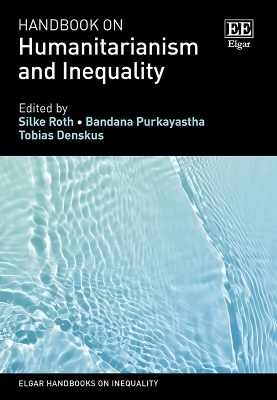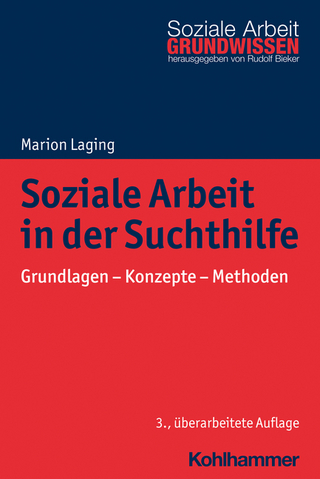
Handbook on Humanitarianism and Inequality
Edward Elgar Publishing Ltd (Verlag)
978-1-80220-654-8 (ISBN)
This prescient Handbook examines inequalities in humanitarianism at multiple levels, highlighting the long-lasting impact of colonialism on contemporary power relations.
Silke Roth, Bandana Purkayastha and Tobias Denskus bring together esteemed experts from the global north and south who introduce crucial research ethics frameworks and methodologies in order to study humanitarianism and inequality. Adopting an intersectional approach, this Handbook demonstrates the ways in which race, gender, class and other sources of inequality intersect in relation to a range of contemporary issues including the role of the media and technology, the COVID-19 pandemic, linguistic inequality, trafficking, and refugee protection and assistance. Looking ahead, the contributors stress the need for academics and practitioners to reflect on the inequalities that both underpin and are perpetuated by humanitarian contexts.
Providing a detailed overview of the ways in which inequality has affected the development and transformation of humanitarianism, this Handbook will be essential reading for academics, students and researchers of humanitarian and development studies, international relations, and sociology and social policy. It will also be of interest to public policymakers focussing on humanitarianism and striving for global equality.
Edited by Silke Roth, Professor of Sociology, Department of Sociology, Social Policy and Criminology, University of Southampton, UK, Bandana Purkayastha, Board of Trustees Distinguished Professor of Sociology, Department of Sociology, University of Connecticut, US and Tobias Denskus, Associate Professor in Development Studies, Faculty of Culture and Society, School of Arts and Communication, Malmö University, Sweden
Contents:
1 Introduction: humanitarianism and inequality – a re-orientation 1
Silke Roth, Bandana Purkayastha, and Tobias Denskus
PART I HISTORICAL AND (GEO)POLITICAL DIMENSIONS OF
HUMANITARIANISM
2 Humanitarianism and colonialism 21
Aoife O’Leary McNeice
3 Humanitarianism and the global Cold War, 1945–1991 35
Margot Tudor
4 Humanitarianism and the new wars: humanitarianism, security, and
securitisation 49
Michael Magcamit and Anastassiya Mahon
5 Humanitarianism, development and peace: a southern perspective 63
Priya Singh and Paula Banerjee
6 Localisation and the humanitarian sector 77
Claudia E. Youakim and Rita Stephan
7 Human rights and humanitarianism 92
Bandana Purkayastha
PART II VARIETIES OF HUMANITARIAN ORGANISATIONS AND ACTORS
8 Humanitarian organisations: behemoths and butterflies 108
Sarah S. Stroup
9 Faith actors in humanitarianism: dynamics and inequalities 125
Olivia Wilkinson and Jennifer Philippa Eggert
10 Diaspora assistance 138
Anjana Narayan and Lise-Hélène Smith
11 Political solidarity movements and humanitarianism: lessons from
Catalonia, Spain (1975–2020) 152
Salvador Martí i Puig and Alberto Martín Álvarez
12 Subversive humanitarianism 166
Robin Vandevoordt
13 Citizen’s groups and grassroots humanitarianism 178
Shoma Choudhury Lahiri
14 Humanitarianism and the military 192
Silke Roth
PART III INTERSECTIONAL PERSPECTIVES ON
HUMANITARIANS AND COMMUNITIES
15 Race, racialisation, and coloniality in the humanitarian aid sector 210
Lata Narayanaswamy
16 Humanitarian organisations as gendered organisations 222
Rianka Roy
17 Sexuality and humanitarianism: colonial ‘hauntings’ 237
Shweta M. Adur
18 Class matters in humanitarianism 251
Patricia Ward and Junru Bian
19 Humanitarianism and disability 265
Dale Buscher and Emma Pearce
PART IV PERSISTING AND NEWLY EMERGING ISSUES
20 Media representations of humanitarianism 281
Valérie Gorin
21 Humanitarianism and pandemics 295
Tulani Francis L. Matenga and Lwendo Moonzwe Davis
22 Humanitarian technologies 308
Reem Talhouk
23 Linguistic inequality in the humanitarian sector: unravelling
English-centric multilingualism 323
Maria Rosa Garrido
24 Climate change, disasters and humanitarian action 338
Ilan Kelman and Eija Meriläinen
25 Refugee protection and assistance 352
Naoko Hashimoto
26 Trafficking in persons, long-term vulnerabilities, and humanitarianism 367
Farhan Navid Yousaf and Muhammad Makki Kakar
PART V REGIONS
27 Humanitarianism and Native America 382
Barbara Gurr
28 Australia, New Zealand, and Pacific Regions 396
Agnieszka Sobocinska
29 International humanitarianism in East Asia 411
Alistair D.B. Cook, Lina Gong, and Oscar A. Gómez
30 West Asia and North Africa 426
Josepha Wessels
31 Africa’s long fight for humanitarian self-sufficiency 443
Oheneba A. Boateng
32 The Latin American experience: inequality’s role in shaping humanitarianism 458
Oscar A. Gómez, Simone Lucatello, and Rodrigo Mena
33 Varieties of European humanitarianism 474
Silke Roth and Tobias Denskus
PART VI METHODS AND KNOWLEDGE PRODUCTION
34 Humanitarian research ethics and the ethics of research in humanitarian
settings 495
Shashika Bandara, Elyse Rafaela A. Conde, Abeer Dakik, and Matthew Hunt
35 Archives and historical perspectives in researching humanitarianism 510
Katarzyna Nowak
36 Quantitative methods 525
Liesbet Heyse, Nina Hansen, and Rafael Wittek
37 Power dynamics in the use of qualitative methods in humanitarianism 539
Margaux Pinaud, Kristina Tschunkert, and Augusta Nannerini
38 Discussing inequalities in evaluation of humanitarian action 555
Bonaventure Gbétoho Sokpoh with Tobias Denskus
39 Pracademvism – forever unequal or the new nexus in global
development and humanitarianism 567
Themrise Khan
| Erscheinungsdatum | 15.02.2024 |
|---|---|
| Reihe/Serie | Elgar Handbooks on Inequality |
| Verlagsort | Cheltenham |
| Sprache | englisch |
| Maße | 169 x 244 mm |
| Themenwelt | Sozialwissenschaften ► Pädagogik ► Sozialpädagogik |
| Sozialwissenschaften ► Politik / Verwaltung | |
| Sozialwissenschaften ► Soziologie | |
| ISBN-10 | 1-80220-654-X / 180220654X |
| ISBN-13 | 978-1-80220-654-8 / 9781802206548 |
| Zustand | Neuware |
| Informationen gemäß Produktsicherheitsverordnung (GPSR) | |
| Haben Sie eine Frage zum Produkt? |
aus dem Bereich


